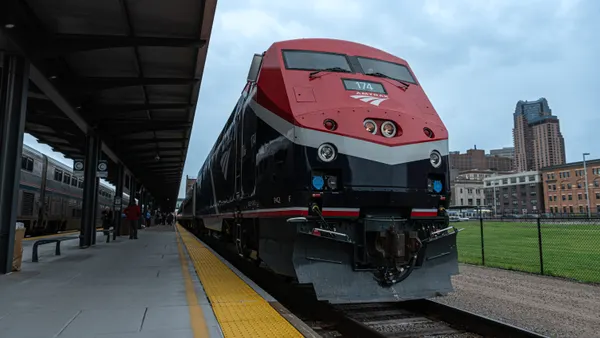Dive Brief:
- Electric scooter-share company Bird is setting aside a portion of its revenue for a new fund to create protected bike lanes and repair and repaint existing ones in cities where the company operates.
- The company is also establishing a Global Safety Advisory Board to work on policies and education to make electric scooter use safer. The board will be led by former National Highway Traffic Safety Administration (NHTSA) chief David Strickland.
- "Bird is bringing the future of transportation to cities all over the world — a future that doesn't rely exclusively on cars and is less damaging to our environment," said Strickland in a statement. "As this valuable work progresses, we also want to make sure that it is a safe future as well.
Dive Insight:
Bird CEO Travis VanderZanden has tried to emphasize safety, notably circulating a "Save Our Sidewalks" (SOS) pledge to competitors earlier this year to lay out best practices. The pledge didn’t go very far — Forbes detailed how specific promises like clearing sidewalks of vehicles every night wasn’t possible for competitors, so many rivals declined to participate — but it was a public indication that Bird was trying to address concerns about its interactions with cities.
Thanks to clutter and some companies launching in cities without seeking proper approval, relations between urban regulators and scooter companies have been frayed, to say the least — a commitment to safety is an olive branch from one of the industry’s leaders. It also follows the announcement of a discount program for low-income riders, waiving the $1-per-ride base fee for certain customers in a bid to expand mobility to underserved communities and give cities more options.
The company’s commitment to the bike lane fund, to come out of a collection of $1 per scooter in use per day, will also build goodwill with partner cities that can be cash-strapped, especially for infrastructure projects. With Bird potentially putting more riders into bike lanes, it not only ensures that they are safe but also makes riders more orderly by not clogging sidewalks.
The participation of Strickland also brings a big name to the effort. After leaving the Obama administration in 2013, he has served as counsel for the Self-Driving Coalition for Safer Streets, a partnership that includes automakers and ride-sharing companies, in addition to work with the regulatory group at lobbying firm Venable. It’s a sign that Bird is putting weight behind its safety effort and wants to participate in discussions with other mobility companies.











